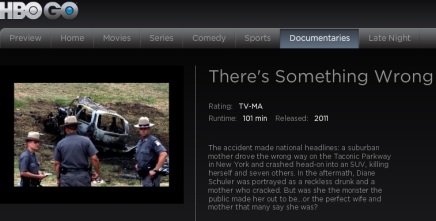The Trouble With Aunt Diane
This is a topic that maybe doesn’t fit conveniently into the theme of this blog, but I wanted to share it anyway. Have you ever read a newspaper article about a horrific accident and wondered to yourself what life is really like behind the headlines for the families involved in the tragedy? (I mean, maybe I’m just nosy or something, but I do, all the time.)
Well, Liz Garbus’ HBO documentary “There’s Something Wrong With Aunt Diane” explores exactly that. It’s a look at the complicated and heartbreaking aftermath of a car accident that killed eight people, half of them were children under the age of 8. Some of you might remember the news story, which was dubbed the “Wrong Way Crash” and the “Taconic Tragedy.”
Brief synopsis: Long Island mother Diane Schuler gets into a minivan to drive five kids (two of them hers, three of them her brother’s) back home from a weekend at an upstate campground one Sunday morning in July 2009. Along the way, her niece calls her father from a cell phone, insisting that “there’s something wrong with Aunt Diane.” Family members frantically call Diane’s cell, which goes straight to voice mail. A short time later, witnesses call 911 reporting a minivan traveling at high speed against traffic on the Taconic Parkway. Schuler’s minivan hits an oncoming SUV, killing all three men in that car, as well as herself, all three of her brother’s kids, and her daughter. Her five-year-old son is the only survivor.
Everyone’s initial reaction is that Schuler had suffered a stroke or some other medical emergency that would seriously compromise her judgement. She loved her kids fiercely, as well as her nieces, and would have never in her wildest dreams wanted any harm to come to them. Besides, everyone insists, she was a control freak and a perfectionist who would never let her emotions or any substance use spiral out of control.
Several days later, an autopsy reveals that Schuler had a blood alcohol level of twice the legal limit, plus a high concentration of THC (marijuana) in her system. The film also reveals that she was prescribed Ambien, a known cause of strange, unconscious behavior.
So Diane Schuler is now apparently some sort of crazed suicidal addict, a demon who recklessly killed her family, and several strangers — and that’s exactly how the media portrayed her.
But in the film, as well as in an excellent New York article by Steve Fishman, Schuler’s husband adamantly denies that his wife was either an alcoholic or a drug addict; in fact, he even disputes the results of the autopsy (his protests are eventually put to rest by a second one). His family sticks by the stroke/medical emergency theory (which they say could have been brought on by a chronically abscessed tooth), and maybe consumed alcohol/drugs in that extremely compromised, desperate state to try to alleviate the pain.
But both Garbus’ and Fishman’s investigations revealed a deeply troubled woman who had been abandoned by her mother at a young age and suffered social and emotional problems well into adulthood. Though she was a high-functioning working mother by any account, there was clearly a private side to Diane Schuler that makes drug and alcohol addiction seem like less of a farfetched notion than her husband would care to admit.
Here’s a quote from a public television interview with Garbus when the film was released in 2011. I think it captures nicely the way our criminal justice system often tries to simplify the reasons people commit criminal behavior: namely, that they are just plain criminals.
Everyone had different stories, different visions of what happened that day. Because there was no trial for Diane Schuler and because there was no judicial process. It just hung out in people’s lives like this terrible terrible wound — an open, gaping wound in the lives of all the people affected that day. Walking around in their world required great empathy. These were people in crisis and when you walk into those worlds and turn your lens on them it’s a huge responsibility.
One of the experts talked about how so many small things lead up to this terrible hole. And we want it to be one bad thing like she was committing suicide or she found out some horrible thing, but what if it were just a dozen small things that were not terrible, but add up to a terrible whole? And I think that’s what we can’t understand.
No, she was not a saint, but no she was not an evil person. And I think there is a tendency to put people in these black and white squares but sometimes they don’t fit. And then when they don’t fit, or when the pattern of the crime doesn’t fit, there’s denial and disbelief.
I’m not saying a more nuanced approach would work (or even matter), in our American pursuit of “justice,” but it’s certainly interesting to think about. I’m constantly surprised by how vehement the public’s desire to “find the culprit” and “put him behind bars” is without any consideration (or at least, curiosity) about the psychology or circumstances behind manifestly criminal acts.
I suppose it’s worth noting that Diane Schuler’s sister-in-law Jackie Hance, who lost her three daughters in the crash, has a memoir, “I’ll See You Again,” coming out next week, and an interview with Ann Curry on “Rock Center” this Friday to promote it. Sigh.


Pingback: In case you missed it: Drunken, Drugged Diane Schuler Wrong-way driver killed 8 –updated | The Trough